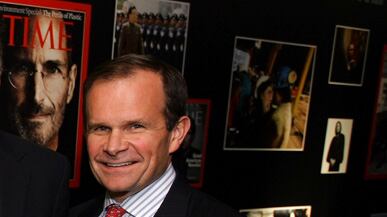Time Inc. was in trouble. With $907 million in 2007 profit bleeding out to just $246 million by 2009, the world’s largest magazine publisher needed a drastic change—and last September, it turned to Jack Griffin, head of a rival publisher, to shake things up.

Fast-forward just five months. Instead of clearing out the old guard of Time Inc. executives, Griffin was the one with a pink slip—fired without warning by Time Warner chief Jeff Bewkes, who wrote in a blunt company-wide memo that Griffin’s “leadership style and approach did not mesh with Time Inc. and Time Warner.”
Every ailing company wants its next CEO to be a “change agent”—those magical avatars of corporate disruption who swap out toxic culture for good and chart bold paths for listless ships, and in so doing turn bearish stocks into bulls. Successful ones, like Louis Gerstner at IBM, go down in corporate lore. But many, like Griffin, enter broken shops that continue to collapse, taking their own careers down with them.
Here’s a look at four self-styled change agents from a range of industries, and how they’re doing in their first years on the job.
Many CEOS enter broken shops that continue to collapse, taking their own careers down with them.
Stephen Elop, Nokia
One well-established trick of the change-making executive is to deliver a rousing call to arms. But no one has seen a memo quite like the one Nokia’s new CEO sent out in early February. “In mere moments, he was surrounded by flames,” Stephen Elop wrote, describing a metaphorical oil rigger who awakens to an inferno. “Through the smoke and heat, he barely made his way out of the chaos to the platform’s edge. When he looked down over the edge, all he could see were the dark, cold, foreboding Atlantic waters. As the fire approached him, the man had mere seconds to react.” What made Elop reach for his inner Tom Clancy? Though still the world’s largest maker of cellphones, Nokia has been utterly trounced in the lucrative smartphone market by Apple and Google. A veteran of Microsoft and Silicon Valley companies, Elop drew criticism for the hyperbolic nature of his “burning platform” memo—as well as praise from analysts for correctly diagnosing the problem. The first non-Finnish CEO in Nokia history, Elop has proved unsentimental, eliminating 1,800 jobs in October and ditching the company’s proprietary software for a deal with Microsoft that could be worth billions. If it doesn’t work, Elop can always write thrillers.
Carol Bartz, Yahoo
Despite being hired to give Yahoo “a little shock therapy,” as The New York Times put it, Carol Bartz has not brought much voltage to the onetime search giant. Rated the most overpaid executive in the S&P 500 last October, with a pay package of nearly $40 million, Bartz has watched a steady stream of talent exit the company as onetime rivals such as Google and Facebook continue to grow. Early fire-breathing (“Let’s give this company some frickin’ breathing room ... and really get outward-looking and kick some butt,” she told analysts on day one.) has petered out, amid regular rounds of layoffs and a mixed record on acquisitions that could have repositioned Yahoo. (Groupon would have been an inspired purchase; Associated Content now looks like a $90 million albatross.)
Alan Mulally, Ford Motors
“Too often we bring in a change agent with misleadingly empty clichés about broom-sweeping, but the truth is, effective change agents don’t do that,” says Jeffrey Sonnenfeld of the Yale School of Management. “There doesn’t have to be this histrionic grandiosity and blood flowing in rivers from the building.” He’s talking about Alan Mulally at Ford. The ex-Boeing exec didn’t bring in squadrons of consultants and hired guns, Sonnenfeld says, but worked with what he had—“and there’s not a person living on this planet who wouldn’t say he’s the best turnaround expert alive.” Ford announced a $6.6 billion profit for 2010 last month, its highest in more than a decade, after losing almost $15 billion in 2008. Detroiters, now erecting a Robocop statue as a half-joking, half-serious morale boost, may want to consider bronzing Mulally next.
Jeffrey Smisek, United Airlines
Changing the losing culture of one company is difficult enough; Jeffrey Smisek is attempting two. Continental and United Airlines completed their $3 billion merger Oct. 1, with Smisek, who had been chief of Continental for less than a year, at the helm. With degrees from Princeton and Harvard Law, he’s not a conventional airline CEO—but has made popular concessions to the merged company’s nearly 90,000 employees, like offering to forego his $730,000 salary and bonuses if his company didn’t make a profit in 2010. That’s not to say he’s a pushover: As boss of Continental, Smisek did away with free meals on certain flights and instituted a $25 baggage fee widely detested by passengers.






